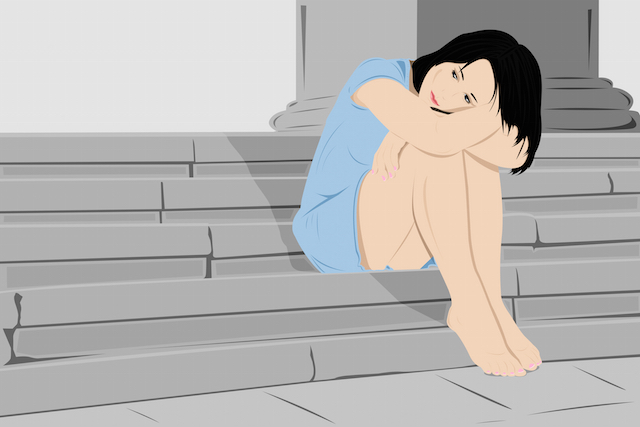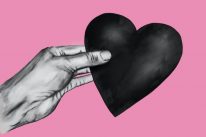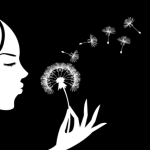
“Every judgment, all of them, point back to a judgment we hold against ourselves.” ~Lynne Forrest
I sat across from my good friend Anna over a cup of coffee. We had been having issues in our friendship and had finally gotten together to discuss them. I’m not a fan of conflict and call myself a “recovering people pleaser,” so I was very nervous.
I noticed immediately that the conversation didn’t seem to be going very well. I addressed my issues concerning our friendship and tried hard to own my part. But Anna kept saying things like, “There are things that you do that really bother me as well, but I don’t say anything about saying them.”
After hearing a variation of this phrase for a third time, I asked what she was talking about. She had never addressed any of these issues with me.
She took a deep breath and said, “Angela, I don’t think your relationship with your higher power is very strong. Also, you know those Facebook posts you write about peace and mindfulness? I don’t see that reflected in your personality. One more thing: Your relationship with your mother seems poor, and I think that’s why you are emotionally needy.”
I stared at her in absolute shock. I felt like I was punched in the face. The worst part is this girl was a very genuine person, so the fact that she saw these qualities in me broke my heart.
My spirituality and my sense of peace are things I have been cultivating intensely since I was sixteen. Here I was sitting across from this girl, who’s supposedly my best friend, and she doesn’t even see these positive qualities in me. I was devastated.
I walked out of that get-together saying I needed some time to be alone and process. I was deeply hurt.
Before we met, I had envisioned us having a positive conversation, fixing our relationship, and spending the rest of the coffee date laughing. Instead, I left feeling like someone had ripped out my heart and like I was going to throw up.
It’s been quite a process wrestling with this event, and I’ve had the opportunity to learn (and relearn) some amazing lessons.
1. Someone’s criticisms and judgments aren’t the problem. Believing them is the problem.
I’ve been criticized before, but these judgments particularly crushed me. I couldn’t stop crying. I felt exposed.
I realized the reason I was having such a hard time with what she had said was because there’s a part of me that believes her judgments about me. For example, if she had told me I was mean, I would have shrugged it off, because I do not believe that about myself.
On the other hand, I do have insecurities concerning my spirituality and sense of peace in the world. While I try to cultivate both of these aspects in my personal life, I’m not perfect. I struggle just like everyone else.
Once I realized I was upset because I believed her accusations to be true, I could stop blaming her. I was in pain because I was torturing myself with these beliefs and blindly believing them.
2. When someone shows us how we’re out of alignment with ourselves, we have an opportunity to change our beliefs.
I’ve seen again and again that the world is a mirror. When we think a thought and believe it, the world will give us an example to prove that thought to be true. Anna showed me the part of me that believed these insecurities. She gave me the beautiful gift of questioning if I wanted to hold onto these beliefs. Remember, we do not have to believe our thoughts.
I heard an example about thoughts once that has stuck with me. Thoughts are like cars zooming on a highway. The highway represents the mind. We get to decide which car we want to jump into. Do we want to jump into the car and believe the negative thought? Or do we want to take the positive route? (Highway pun intended.)
So, I get to decide. Do I really want to hold onto the belief that I don’t have a strong spiritual relationship? That seems like a painful story to believe about me. Instead, I am choosing to reframe the belief. Instead of believing that my spiritual relationship is weak, I choose to believe that it’s a work in progress. It’s beautiful because it’s not perfect, but even still, I spend time cultivating it every day.
3. It’s not our business how other people see us; it’s our business how we see ourselves.
A lot of the time when we are feeling in emotional pain, we are not in our business. It’s not my business what other people think of me. My thoughts and assumptions of me are my responsibility, and that’s enough to keep me busy.
Once I get clear on what’s actually my business, it’s amazing how many of my troubles simply vanish. It also gives me the opportunity and the time to change my thinking and take care of myself.
4. Look for the truth in the criticism and leave behind the rest.
Take this piece of advice with a grain of salt. If you can find what’s true about the negative things people tell you, it can be a great tool to strengthen your character. But it’s not an excuse for self-abuse.
For example, some of the things Anna said, I don’t find to be true for me. But I do sense that sometimes I can be emotionally needy with my friends. This doesn’t mean I beat myself up about this character quality. I can reevaluate how I am sharing my emotions and with whom I’m sharing them, and see if I am becoming co-dependent with certain people in my life.
I believe the depth of my emotions makes me beautiful, and sharing it with others has positively deepened many of my relationships. But it’s a good reminder for me to evaluate if I was sharing my emotions in a healthy way or if I was dumping them onto my friends to make me feel better.
5. Find gratitude in every situation.
I believe it’s important to find the gift in every event so we can grow. If we look deep enough, we can find the seed of gratitude in any situation. I realized after sitting with this experience for a week how thankful I was for my friend, for giving me the opportunity to see the painful beliefs I held about myself. Now I had the opportunity to clear them. What a blessing!
I also realized how thankful I am to have a friend who will be honest with me and tell me what she believes to be true. This does not mean that I have to take her judgments on as my own, but her reflections of me are pertinent in my journey to releasing these painful beliefs.
6. Always try your hardest to forgive people and yourself.
Forgiveness is one of the most difficult but powerful processes. I believe forgiveness is twofold. Not only did I need to forgive her, I needed to forgive myself. While I realized it was a blessing that she said these things, letting go of my anger for “exposing me” was hard. I knew intellectually I needed to forgive her, but actually doing it was a different story.
Once I realized I needed to forgive myself first, letting go of my anger became easier. I had to forgive myself for blindly believing these judgments about myself and not questioning if they were true. I had been holding myself hostage; she had just shown me that I was the one keeping myself behind bars.
—
Our relationship is not back to the way it was before we started having issues. While I hold a deep sense of respect and love for Anna, I realized at this point in my life that I didn’t want to be best friends with someone who saw me that way.
This doesn’t mean I don’t love and respect her. I have a deep sense of gratitude for what she has shown me about myself, and I have hope that our relationship will be even greater one day, because it will be more honest.
I still have to questions these judgments about myself, because after carrying them for so long, they don’t magically go away.
Once I become secure about these qualities and come into a more loving relationship with myself, I will think about rekindling the friendship, but maybe not. Only time can tell. Till then, I will keep on forgiving myself, questioning these beliefs, and reframing them to come into a more loving relationship with myself.
What has helped you respond well to criticism and judgment?
About Angela Lois
Angela Lois works as a recovery coach supporting adults with serious mental illnesses. By night, she is a professional violist. Angela L. shares her stories of her life to combat shame and help people feel more seen. If you would like to receive coaching from Angela or connect, you can connect with her on Instagram @angelaloie or email her at angelaloiscoaching@gmail.com.













 Though I run this site, it is not mine. It's ours. It's not about me. It's about us. Your stories and your wisdom are just as meaningful as mine.
Though I run this site, it is not mine. It's ours. It's not about me. It's about us. Your stories and your wisdom are just as meaningful as mine.